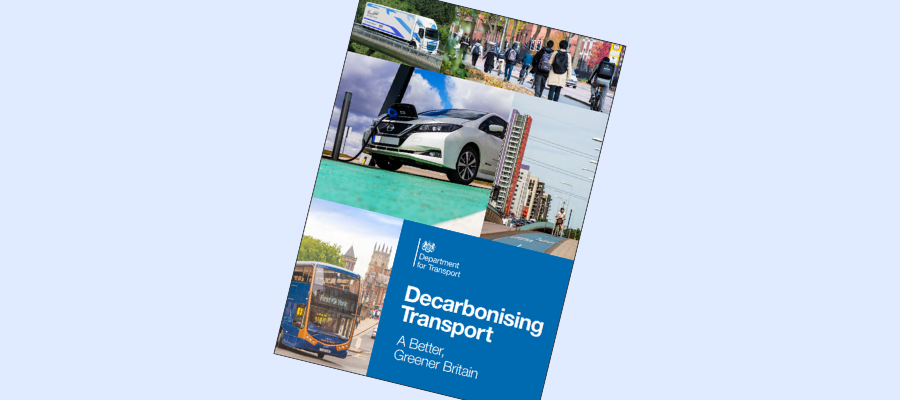🕒 Article read time: 2 minutes
Ambitious plan marks a step change in the drive to decarbonise logistics

First mooted for publication last autumn, the government’s Transport decarbonisation plan, finally launched last week (14 July 2021) has been a long time in gestation.
Spanning all modes of transport, from walking and cycling to maritime and aviation, the plan is broad and comprehensive in its approach. It also takes a long view, offering a route map on the steps that must be taken for both passenger and freight transport to decarbonise and achieve net zero emissions by 2050.
PHASE-OUT OF NEW NON-ZERO EMISSION HGVS
Four other documents were published alongside the plan – the non-zero emission HGV Phase-Out Consultation, the Green Paper on a New Road Vehicle CO2 Emissions Regulatory Framework for the United Kingdom, the Rail Environment Policy Statement and the Jet Zero Consultation.
According to Department for Transport (DfT) figures, close to one sixth (16%) of domestic greenhouse gas (GHG) emissions came from HGVs in 2019. The plan said that the transition to zero tailpipe emissions is already underway for small commercial vehicles, where product is already reaching the market, and predicted that the next decade will see rapid progress and investment in zero tailpipe emission technology options for HGVs. The European truck manufacturers’ association, ACEA, has already pledged to end the sale of fossil fuelled HGVs by 2040.
DfT’s non-zero emission (at the tailpipe) HGV phase-out consultation proposes two different dates: 2035 to end the sale to end the sale of new non-zero emission HGVs above 3.5 tonnes and up to and including 26 tonnes; 2040 to end the sale of new non-zero emission HGVs above 26 tonnes.
The Green Paper will seek to establish a regulatory framework to deliver these phase out dates and ensure emissions reductions from conventional vehicles along the way.
DEMONSTRATING ZERO EMISSION HGV TECHNOLOGY
DfT has declared itself agnostic about which technology or fuel will be the most viable to power long-haul HGVs, citing “uncertainty about which zero emission technology is most suitable”. However, it is placing a large degree of confidence in Original Equipment Manufacturers (OEMs) and other technology stakeholders by investing £20 million this year to develop cost-effective, zero-tailpipe emission HGVs and refuelling infrastructure across the UK. This includes designing electric road system (eg overhead catenary) and hydrogen fuels cell trials and offers funding to demonstrate real world applications of emerging battery electric trucks.
BRIDGING THE PRICE GAP
The plan acknowledges that while zero tailpipe emission trucks currently on the market are suitable for a range of operations, they currently have a higher upfront price than diesel equivalents. To help reduce the price gap, the government has committed to a package of measures to accelerate the deployment of new zero emission HGVs and realise early carbon savings.
It is providing more than half a billion pounds (£582m) to continue the plug-in grants until 2022-23, including support for the plug-in truck grant. Set at 20% of the purchase price, the grant reduces the price of zero emission trucks, with up to £25,000 of funding available for the largest HGVs.
The HGV consultation is also seeking views on whether to extend the phase-out dates to HGVs using low carbon fuels and if the maximum permissible weights of zero tailpipe emission or alternatively fuelled HGVs should increase to allow for their powertrains, which tend to be heavier owing to the additional weight of batteries or hydrogen storage tanks.
Michelle Gardner, Head of Public Policy and decarbonisation policy lead at Logistics UK, said: “We are supportive of the government’s ambitious Transport decarbonisation plan, and are pleased that it helps provide a clearer picture of the pathway to net zero for logistics businesses. The consultation on proposed phase out dates for new non-zero tailpipe emission HGVs should enable business to move forwards with more clarity and confidence.
“We know our members are already taking important steps, including investing in lower carbon fuels and technologies, to help lower greenhouse gas emissions across their operations. But to achieve net zero, much more needs to be done across all logistics transport modes and all parts of the supply chain, such as distribution centres and warehousing.
“Over the coming months and years, Logistics UK will work with our members, the government and policymakers to help make this goal a reality.”
*www.logistics.org.uk/campaigns/environment
Published On: 22/07/2021 16:00:22

Comments Section
If you are a Logistics UK member login to add comments.